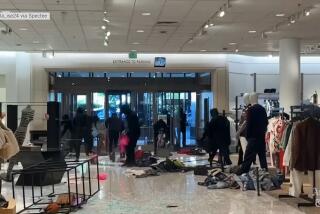Unproven Theft Charge Grounds Travel Agent
- Share via
Question: I’m a 34-year-old travel agent. I stayed late one night to help a regular client who needed to book a tour to Cancun, Mexico, right away. He paid $979 in cash and received the tickets. I did the paperwork and showed it to a co-worker, who soon left, but I was tired and by mistake I left the money on my desk instead of putting it in the safe. The next morning, it was gone.
A cleaning crew had been in the office overnight and a co-worker had been there early the next morning, but I was blamed. The cleaning crew was never questioned. Since I was the last person with the money and responsible for putting it in the safe, I felt I should make up the loss. I relinquished my entire two-week paycheck to the travel agency’s owner.
Soon after, the company fired me, saying money doesn’t get up and walk away from a desk. I knew this would hurt my references, so I’ve started my own travel agency. But I’ve been forced to move in with my parents.
I’ve collected thousands of dollars during my 14 years as a travel agent and nothing like this ever happened to me before. I don’t even know my rights on this subject.
Answer: Stolen money--regardless of who took it--is an ugly issue that eventually crops up in almost every workplace. Many cases are never referred to the police because companies don’t want negative publicity. National Computer Systems Inc., which studies employee theft, estimates that one in three workers commits some kind of theft at work, such as stealing money or supplies or faking illness.
This case is unusual because managers often prefer to blame the cleaning crew rather than confront longtime co-workers, said Deborah Keary, manager of the Society for Human Resource Management’s information center, who said she believes janitors are often unfairly maligned.
Keary said most employers would view the travel agent as being “somewhat at fault” because of her carelessness in leaving the money out on the desk. Nevertheless, assuming the facts are correct, Keary said she thought it was improper, in fact “amazing,” that the company would fire the worker after she made up the loss.
An employee accused of misbehavior should ask for a full, good-faith investigation into the incident, Keary said. Her society offers these guidelines for employers conducting internal investigations: Select an impartial investigator; inform everyone of the severity of the allegations and potential consequences; thoroughly question all witnesses without steering the conversations; gather all the facts; determine whether anyone has a motivation to lie or a history of animosity toward the accused and assess each worker’s credibility. After careful consideration, take appropriate action.
Companies must react promptly to theft or it can proliferate, said John W. Jones, a senior psychologist at National Computer Systems and longtime researcher into workplace theft. Anonymous surveys have shown that workers who report that their co-workers steal are more likely to steal themselves, he said. “If an organization is perceived as tolerant of theft, it wrecks the security foundation of that company.”
Jones takes a hard line. He said “extreme carelessness,” such as failure to put money into the safe, can be a firing offense.
In a 1999 survey of employee theft for the restaurant industry, his group found that workers who anonymously report that they steal tend to be young (16 to 30), plan to leave their jobs within three months and are more likely to abuse drugs and alcohol. Workers are less likely to steal if they are older; view their employers as fair, caring, and offering equitable pay and benefits; and expect to remain employed there for more than a year.
Generally speaking, employers have the right to hire and fire workers at will, unless employees are covered by a collective-bargaining agreement. Theft is almost universally viewed by the courts as a legitimate reason for termination. But fired workers have successfully sued former employers for injuring their professional reputations if it can be proven they were unfairly maligned.
*
Q: I’m looking for a new job. Although I know it’s not a good idea to be late for a job interview, I’ve been late twice. The first time I was 22 minutes late; the second time I was three minutes late. One time the bus I took hit heavy traffic, and another time there was a disruption in bus connections. Both times, the interviewers asked me whether I had trouble finding the place. I said no. I didn’t get either job.
I can understand that being 22 minutes late would be cause for concern, but what about three minutes late? What should I have said?
A: Apologize, of course, preferably as soon as it becomes apparent that delay is unavoidable. Call immediately and let the employer know what’s happened, said Peter Post, great-grandson of etiquette doyenne Emily Post and co-author of a new book on workplace manners, “The Etiquette Advantage in Business: Personal Skills for Professional Success.”
Arriving late for a job interview is “inexcusable” and destroys that all-important first impression, Post said. In today’s fast-paced economy, many executives’ schedules are so tightly packed that losing a few minutes can squeeze the day’s agenda. So job-seekers should plan to arrive 10 minutes early, he said. He also recommends visiting the building in advance to be aware of logistical problems and to see how workers commonly dress. “Get the lay of the land,” he said.
Take no chances, he added: “This could be your future for the next 10 years.” Or not.
Kirstin Downey Grimsley can be reached via e-mail atdowneyk@washpost.com.
More to Read
Inside the business of entertainment
The Wide Shot brings you news, analysis and insights on everything from streaming wars to production — and what it all means for the future.
You may occasionally receive promotional content from the Los Angeles Times.










